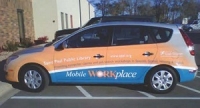Northstar Digital Literacy Project
Saint Paul Public Library, Minn.
Innovation Synopsis
Challenge/Opportunity
Since the start of the recession, staff at the Saint Paul Public Library (SPPL) have worked everyday with people lacking the computer skills necessary to find and use library resources, apply for jobs on-line, engage in e-commerce and e-government, or participate in adult basic education and career readiness programs. Frequently after computer classes, patrons asked if we would write a letter confirming their participation so they could use it in their job search. The lack of basic computer literacy prevented many from accessing the resources and programs designed to help those most challenged by the recession. In addition, as we added classes and open labs led by staff, volunteers, work-study students and others, we didn’t know if we were offering consistent content at our different libraries; if the teaching was effective; and if our patrons, who often sought help at more than one organization, were learning the same skills at SPPL as at other community-based organizations. To respond to our patrons and improve the quality of learning at SPPL and other community organizations, we initiated a project with the Saint Paul Community Literacy Consortium to assess basic digital literacy skills and offer a certificate of mastery to help in job search. We thought we would find an existing tool, but we found no instrument that was free and designed at a low-enough literacy level.
Key Elements of Innovation
The Northstar Digital Literacy Project (NDLP), launched in October 2012 through the collaboration of numerous local organizations. NDLP offers free on-line basic digital literacy skill assessments in six modules: basic computer use, world wide web, Windows® 7, Mac OS X®, using e-mail and Microsoft Word®. Practitioners with experience teaching basic digital literacy developed standards for each module to test mastery of 16-20 basic skills. SPPL and community organizations piloted the modules to test for effectiveness. The assessments, available in English and Spanish, are written at an approximately fourth grade reading level and include audio instructions for learners lacking reading skills. The on-line assessments are freely available on the Internet. When each module is completed, a report is generated that demonstrates which skills an individual has mastered and which still need work. Organizations may become sponsoring sites, which allows them to proctor test-takers and award a certificate of mastery to individuals successfully completing one or more assessments. Sponsoring sites, which pay a small annual fee to ensure sustainability of the project, are also able to access data on how learners at their site perform, feedback that improves quality instruction. The development of the on-line tool was funded by the Institute of Museum and Library Services and the Otto Bremer Foundation. Use of the Northstar assessments has been growing steadily since the launch. Over 35,000 people have taken an assessment on the public website and 6300, through a sponsoring agency. Sixty-nine organizations in 21 Minnesota cities, Chicago, and San Jose now offer the certificate, including libraries, adult basic education programs, community technology centers, schools, and job training centers.
Achieved Outcomes
At SPPL, the NDLP has improved our patrons’ digital literacy skills and provided a credential to help with job search. We have improved the quality of our instruction by using the assessments as pre- and post-tests. All basic computer classes and instruction offered at SPPL, whether taught by staff, work-study students, or volunteers, teach to the same standards. While the NDLP is not a curriculum project, we have developed curriculum for each module, ensuring consistency and quality and facilitating the use of volunteers. We have learned that the availability of the certificate sparks more interest in the classes, particularly among non-English speakers. In the Twin Cities, the NDLP has helped to strengthen the network of community organizations offering basic computer training. The Community Technology Empowerment Project requires its AmeriCorps volunteers to use the NDLP at the 30 Twin Cities host sites in order to demonstrate effective program outcomes. Around the state, the NDLP has been a timely tool as understanding grows that basic computer skills are a prerequisite for other types of learning and service delivery. Funded with a BTOP grant, the Minnesota Intelligent Rural Communities Initiative, an on-line instruction program for job seekers, incorporated the Northstar standards. To help people likely to exhaust their unemployment benefits, the Minnesota Department of Employment and Economic Security is piloting a program starting with participants taking the Northstar assessments. The state’s Adult Basic Education program is piloting an initiative to integrate the Northstar standards and assessments into support for on-line learning.

